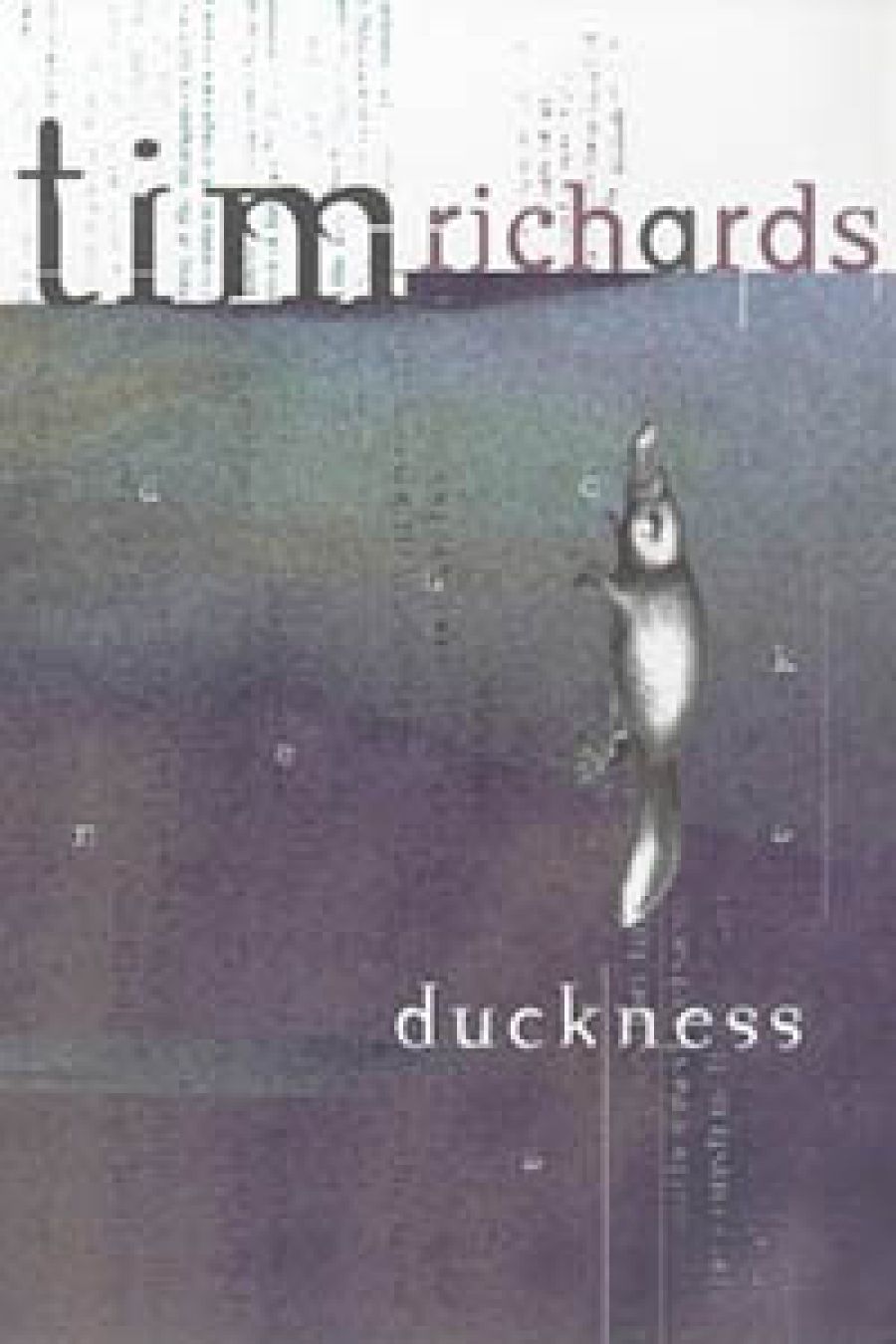
- Free Article: No
- Contents Category: Fiction
- Review Article: Yes
- Article Title: Quirky and Enigmatic
- Online Only: No
- Custom Highlight Text:
A title like Duckness summons expectations of the quirky, the paralogical, and the obliquely enigmatic, and this collection delivers all three – though somewhat unevenly. It traverses imaginary heterotopias which both are and are not Melbourne, and which centre, for the most part, on disturbing and difficult questions of simulation and authenticity.
- Book 1 Title: Duckness
- Book 1 Biblio: Allen & Unwin, $16.95 pb, 162 pp
The liberating gestures of this tradition remain compelling: there is a quality of rumination to Duckness which continues the project of unlocking the uncanny other side of city life. Melbourne is the city of rejection, despair, and sexual cynicism, a strangely ruined space connoting impotence, alienation, and even necrophilia. (A futurist Melbourne is inhabited by teenage death-cultists who ostend morbid fascination as cultural hyper-cool).
One of the two ‘foreign’ stories of the collection, ‘An Evening with Boo Radley’, is set in a lovelorn Paris and concerns both mistaken and performing identities. Misrecognised as Hugh Grant, the narrator is subject to embarrassing film-star adulation by a character whose job it is to perform one-woman summations of To Kill a Mockingbird. She invites the hapless narrator to her apartment, and while he is riven with comic-hyperbolic sexual indecision (to be or not to be Hugh Grant), his fan does Boo Radley in many voices. It is a wry and clever story, preoccupied with the ethics and epistemology of phantastic fame.
Doubles and replication are a concerted theme of this collection. In ‘Gavin’s Method’, Richards exploits the multiple ironies of ‘method’ acting by telling of a man obliged to live with the actor playing him in a TV documentary. Cursed with the somewhat ludicrous experience of sitting for twelve days in the fork of a tree after a flash flood (to which the logical riposte is: why didn’t he descend?), the ‘Fork Man’ is then humiliated by soapie-star Gavin’s much more convincing version of himself. In that strangely repellent phrase, Gavin is his ‘dead spit’. Replication is everywhere figured as morbid reification; and art functions merely as its sinister agent and alibi.
Almost all of the stories in Duckness are written in the first person, and governed by a barely contained tone of desolation. This is most discomforting in a series of stories about lost love: four stories are devoted to narratives about lost-Catherine, and elsewhere she appears in allegorical avatars (‘Amber’, ‘Miranda’) – all women who have cruelly rejected the narrator. This fixation with rejection undermines and corrodes the ingenuity of the narratives, and warps their sexual politics with a vague misogyny. In ‘The Black Dog’, the narrator attends a creative writing class and is (wisely) advised by his tutor not to indulge in vindictive revenge narratives against old girlfriends. We are invited to read narrator-as-author in a case of special pleading where revenge against ‘Catherine’ is weakly justified as ‘cathartic’. This is an unfortunate inclusion in the volume: grave metacritical commentary which expatiates on authorial intention looks curiously narcissistic beside the other more poised and circumspect fabulations.
The title story is also a disappointment. ‘Duckness’ is an oddly anachronistic high-school comedy about a discussion of D.H. Lawrence’s Women in Love in a year twelve class. Duckness simply refers to the number of times ‘darkness’ is used by Lawrence, a joke intended to reveal the ‘overrated crap’ of his style. The humour is adolescent and the story given to uninformed proselytising against literary theory (‘Who is going to create values, and question values, if you’ve got the brightest students in the country convinced that the only thing worth doing is reading French theorists in translation and gazing up their own arse?’) ‘Duckness’ is an uncharacteristic choice to open and title this volume, since it offers no foreshadowing at all of the subtlety, wit, and imaginative excursiveness of some of the later pieces. It is the stories of ‘metaphysical distraction’ – based on the mysteries of contingency, impermanence, and the longing for completion – which both distinguish this volume and indicate the narrative sophistication of which Richards is capable.


Comments powered by CComment